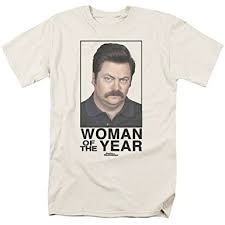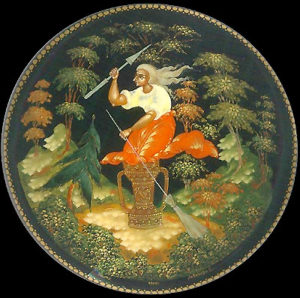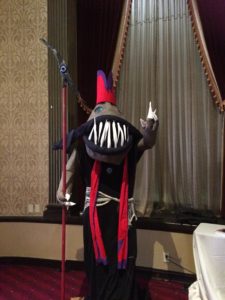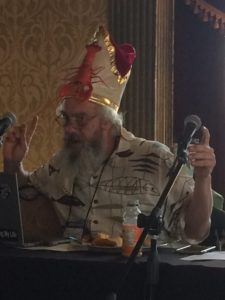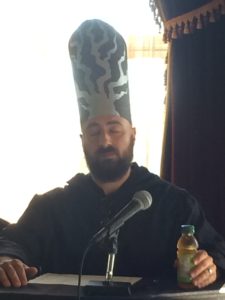Iä, everyone! I continue my report from NecronomiCon Providence, the recently concluded convention devoted to all things H.P. Lovecraft. Here are some highlights from the panel discussions and author readings. (I did not attend the off-site movie screenings because I am (A) chicken and (B) have no sense of direction even with a map.) Generalized trigger warnings apply for all links below: death, creepiness, blasphemy, sexual situations, etc.
Author discoveries:
Guest of honor Kij Johnson‘s fiction blends poetic surrealism, horror, and feminist critique. She read “Mantis Wives”, a strangely poignant–even romantic–story about the female insects’ well-known habit of decapitating their mates, and an excerpt from her novella The Dream-Quest of Vellitt Boe, which was vivid and tense but went somewhat over my head because I haven’t read Lovecraft’s “Dreamlands” stories. Johnson also referenced her Nebula Award winning story “Ponies”, available on the Tor.com website. It is a masterpiece about the cruelty dealt to, and inflicted by, little girls. I know it’s a great story because I keep trying and failing to think of alternate choices that would avert the protagonists’ bleak fate.
James A. Moore read a suspenseful excerpt from his novel Deeper, a horror/adventure novel about what happens when Lovecraft’s sinister New England town of “Innsmouth” is rebranded as a tourist destination named Golden Cove, and a marine research team discovers that the monstrous Deep Ones still live in its waters.
Matt Bechtel read from his debut collection Monochromes. His punchy reading style went perfectly with the rapid-fire humor of these flash fiction pieces, with their unexpected turns toward melancholy or terror. Some followed the logic of high-concept poetry: for instance, what happens when “Someday” finally comes?
Nnedi Okorafor prefaced her reading by pointing out that humans, usually white and Western, are the default characters in alien first-contact stories, and it’s really time to shake things up. She read the fantastic beginning of her novel Lagoon, where first contact is made instead with marine animals in the ocean outside Lagos, Nigeria. Okorafor’s multiple-award-winning novels include the Binti and Akata Witch series.
Craig Laurance Gidney read the beginning of a very scary ballet story from his limited-run novella The Nectar of Nightmares, and I may never find out how it ends because it’s out of print. Damn it, Craig. I’ll check out his Lambda Literary finalist collection Skin Deep Magic instead.
Gwendolyn Kiste read the title story from And Her Smile Will Untether the Universe, a fine example of movie-buff noir about a murdered actress haunting an obsessed fan.
Panel discussions:
“Writing Non-Stale Mythos Tales” (Vincent O’Neil, Alex Houston, Kij Johnson, Tom Lynch, Peter Rawlik):
Cthulhu has been so normalized by pop culture, how can we create a frightening Mythos tale today? Think about what makes any story a fresh example of an established tradition, e.g. fairy tale retellings. You could write about what is left out: center the perspectives of supporting characters, as in “Rosencrantz & Guildenstern are Dead”, or the original author’s blind spots–obviously race and sex were big ones for HPL. New books looking critically at Lovecraftian racism in a Mythos contest include Victor LaValle’s The Ballad of Black Tom (which I loved!) and the anthology Heroes of Red Hook (Golden Goblin Press), all stories from the POV of minority-group characters in the Jazz Age setting of HPL’s singularly racist story “The Horror at Red Hook”. Unusual genre mashups bring out distinctive features of both: P.H. Cannon’s Scream for Jeeves parodies Lovecraft by bringing his cosmic horrors into the world of his contemporary P.G. Wodehouse’s frothy upper-class comedies. (I must read this!)
A key element of a Lovecraftian story is the movement from faith to gnosis. Characters discover that the universe is not at all what they thought it was. In a sense, this is always a fresh theme, because we can all be terrified by the loss of what we believed in, or getting what we want and regretting it. Our own personal mortality comes as a surprise emotionally, whatever we might know intellectually.
The panelists were in agreement that tentacles do not a Mythos story make. Neither does pedantic flowery language. Most writers don’t have the vocabulary and grammatical discipline to imitate HPL’s style. We’re in a post-Mythos world where we can’t be surprised by the same discoveries that HPL’s characters made. No modern person would meet Cthulhu in real life and not already know about the books. Perhaps all fiction is meta-fiction now! Everyone is aware of living in a particular genre and literary tradition. (My favorite example of this is the scene from the movie “Stranger Than Fiction” where Dustin Hoffman asks Will Ferrell 23 questions to determine what genre of novel he’s living in, so he can stop the author from killing his character. “Do you find yourself inclined to solve murder mysteries in large luxurious homes? Has anyone left a large wooden horse outside your door?”)
“Guests of Honor Panel” (s.j. bagley, Ellen Datlow, Kij Johnson, Stephen Graham Jones, Steven Mariconda, Nnedi Okorafor, John Jude Palencar, Donald Sidney-Fryer, Richard Stanley, Peter Straub)
Squee! I shared an elevator with editor extraordinaire Ellen Datlow! I played it cool, though, and did not exclaim how her horror anthologies have pleasurably scared the crap out of me since high school. I also felt like a high-level fangirl for remembering Omni, the science fiction and fantasy art magazine that I read in the 1980s. Datlow was their fiction editor back in the day.
The panelists spanned the genres of fiction, criticism, poetry, visual art, and film. They considered: What is “weird fiction” (or poetry, etc.) and why do we create it? It is creative work that presents us with the unnameable, makes us grapple with our insignificance, or dissociate from normal modes of cognition to see another aspect of reality. Straub said, “I like the sense of luxuriance… amplitude… narrative overflow” in probing the limitations of human comprehension. Sidney-Fryer observed that “the weird serves to purify the ordinary emotions by heightening them.”
In what sense is weird fiction political? Panelists disagreed as to whether all art was already political, versus the mid-20th-century New Criticism dictate to stick with the words on the page. Some suggested that it’s political–perhaps by virtue of being anti-political, unconstrained by ideology or “decency”–to write about taboo subjects. Straub called it liberating to face the experience of abjection, to stay present with the emotional discomfort of the events on the page, instead of spinning intellectual theories about them. Consciously layering political agendas onto our reading can be an avoidance mechanism.
“Anyone who writes fiction where cruelty is a common thread is surely responding to the presence of cruelty in his own life,” added Straub. He said he came from a “classic traumatic childhood” and was supremely blissful when writing a novel about sociopathic serial killers, because it was cathartic! “Dark” fiction is integrated fiction. In American life, we are taught that it’s a moral duty to reject the shadow side, but that is where our life takes root. The biggest religious moralizers are often the ones who are caught in perverse scandals.
“A Very Terrible Difference: Race, Gender, and the Other” (Byron Nakamura, Faye Ringel, Jenna Randall, Troy Rondinone, Fiona Maeve Geist, Eli Shurberg, Daniel Schnopp-Wyatt)
Humanities professor Faye Ringel gave a paper on Lovecraft and racism, surveying some of the recent literature that’s used the Mythos to criticize HPL’s politics: Black Tom, Matt Ruff’s wonderful Lovecraft Country, and Paul Lafarge’s The Night Ocean, which she said examines HPL’s possible homosexuality. (The old boy seemed more asexual to me, but am I going to object to slash fiction about anybody? Never.) Both LaValle’s and Ruff’s black characters decide the Old Ones are not as scary as white humans. Interesting fact: the first KKK represented themselves as the living dead, the ghosts of Confederate soldiers, so ghost stories are an apt genre for a novel about American racism.
Troy Rondinone discussed Orientalism in 19th and early 20th century pulp fiction. Orientalism is Palestinian cultural critic Edward Saïd’s theory that the East is configured in the Western mind as the Other, a surrogate or underground self that defines the West in contrast to its alleged backwardness–decadent, exotic, mysterious, deceptive, effeminate. Hence the many references to primitive death cults and menacing gods of Egyptian origin in the work of HPL and contemporaries. Watch out for the same unfortunate tropes today in films like “The Mummy” and “The 300”.
Geist and Shurberg (Hampshire College, represent!) gave a paper about mapping intersections of queerness and negativity. Geist quipped that though we don’t know much about Lovecraft’s sex life, his stories are “kind of thirsty” about miscegenation. Scholars and fans have made this fake hermetic separation between HPL the great writer and HPL the gross racist. (Indeed, primo Lovecraft biographer S.T. Joshi dis-invited himself from this year’s convention to protest what he felt was excessive focus on the author’s political sins. Too bad so sad.) Our reading of him will be deepened by putting these halves back together.
HPL’s incorporation of eugenicist views in his writings fits with his stated personal opinion of sex as mechanistic and degraded, an undisciplined force that potentially leads to the degeneration of the social body and the species. More than just a product of his time, his racism harks back to the academic literature of the 1800s, about the virile empire that goes forth to conquer lesser peoples but is vulnerable to impurity from interbreeding. These scholars developed complex racial taxonomies that remind us of Lovecraft’s fixation on the genealogy of once-great families in decline.
For a cosmic pessimist who believed in the universe’s indifference to human values, HPL was heavily invested in the moralistic hierarchy of the races. “He was an atheistic Puritan.” Perhaps that was the repository for his anxiety about his own metaphysics–faith in fragile white civilization replaces traditional religious faith. “The Call of Cthulhu” encapsulates this paradox: the opening describes the dark seas of infinity and the tiny happy island of ignorance, and isn’t it a coincidence that all the Cthulhu cultists are people of color?
This observation was a good segue into Daniel Schnopp-Wyatt’s paper about the historical antecedents of “Call of Cthulhu”, which has a memorable scene of a human sacrifice cult in the New Orleans bayou. In the early 1910s there was a notorious spree of axe murders in Louisiana against the families of poor black agricultural workers. The media sensationalized them with rumors that the killings were related to voodoo. A 17-year-old black girl named Clementine Barnabet was coerced into confessing, then subjected to brutal medical and psychological treatment in prison. Schnopp-Wyatt is dubious about her connection to the murders, let alone voodoo. This paper left me agreeing with “Black Tom” that I’d take tentacled aliens over a run-in with the American mental health and criminal justice systems, any day.
Until next time, I’ll see you in the Rapture–
It’s a gift to be squamous,
it’s a gift to have fins,
it’s a gift to have gills
when Cthulhu wins.
When all the stars are right,
on the world’s last night,
we will swim in the glory of R’lyeh’s light.
(Darrell Schweitzer’s Innsmouth Tabernacle Choir Hymnal)
